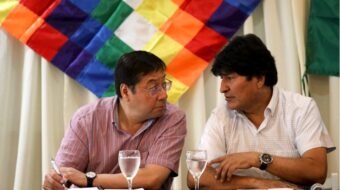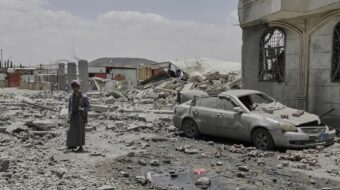
CARACAS – I traveled to Caracas, Venezuela over the Thanksgiving holidays. What I observed was pretty amazing. Caracas is a beautiful, vibrant city in an amazing transitional period.
President Hugo Chavez and the political party he heads, i.e. the United Socialist Party of Venezuela are moving forward in a very progressive direction. People told me that Chavez has dramatically improved health care, education, food and housing for poor, working people. I saw a model of a drug and alcohol treatment center for poor people initiated by Chavez. There are institutions of higher learning which have been opened to serve poor people while Chavez has been in office. Health care clinics have been built in poor neighborhoods and staffed by Cuban doctors. Poor people receive assistance with housing and food. Bank accounts for working people are now secured through a federal system. Prior to Chavez, private banks could close at will and were not under any obligation to return the money in people’s bank accounts. This has now all changed.
Many of the poor live in shanties in the mountains to the north of Caracas. Chavez has initiated the construction of cable cars from the city to the mountains to assist the poor in traveling to the city for work and has greatly increased their access to services.
I was told there is a split in the Catholic Church as a result of the efforts of Chavez. Priests and other church officials who are closely associated with the wealthy elite oppose Chavez and his policies. On the other hand, the priests who work with and serve poor people support Chavez and his policies.
While traveling around Caracas, there were numerous billboards proclaiming the importance of recognizing the dignity of the people and they called for a “Bolivarian socialist revolution” for all people including the indigenous peoples of Venezuela. There were posters calling for peace visible on the National Library.
In the Plaza Bolivar, there were PSUV workers in red shirts among the people talking with them about the importance of people’s culture. A PSUV speaker emotionally exhorted his audience to be mindful of the consequences of the U.S. military bases in Colombia.
Caracas has many beautiful museums. The museums pay a lot of tribute to Simon Bolivar, the “Libertador” of Venezuela and surrounding areas. Bolivar fought against imperialism and defeated the Spanish colonialists. He also fought against slavery. His dream was to unite northern South America into a huge region he wanted to be known as “Colombia.” Had his dream come to fruition, this region would have encompassed the countries we now know as Venezuela, Colombia, Ecuador, Peru, Panama and Bolivia.
If you want to see history in the making, travel to Venezuela. You, too, will be amazed.










